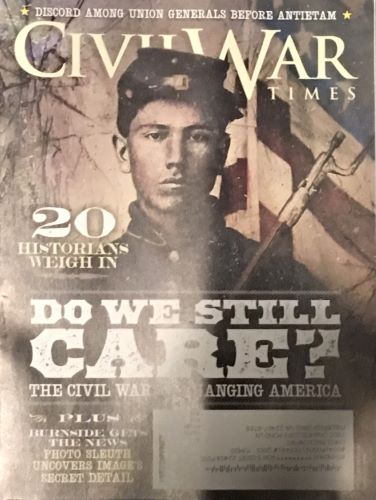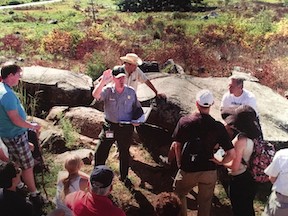Do We Still Care: The Civil War in a Changing America
 Does the Civil War still matter to America in 2019? That’s the question Civil War Times asks in its latest issue, hitting mailboxes this week. Emerging Civil War is pleased to partner with Civil War Times to extend the conversation beyond the magazine and into the blogosphere.
Does the Civil War still matter to America in 2019? That’s the question Civil War Times asks in its latest issue, hitting mailboxes this week. Emerging Civil War is pleased to partner with Civil War Times to extend the conversation beyond the magazine and into the blogosphere.
Beginning next week, ECW’s historians will tackle the question posed by the cover story of the December 2019 issue of Civil War Times: “Do we still care? The Civil War in a Changing America.”
Civil War Times editor Dana Shoaf will join us for the conversation with a post of his own.
 Check out the hard-copy of the magazine to hear from twenty historians, including our own Lee White and our good friends Drew Gruber and Steve Phan, as well as such luminaries as Jim Lighthizer, William C. “Jack” Davis, Megan Kate Nelson, and Gary Gallagher–twenty great voices in all. (And look for a cameo appearance by our own Dan Welch in his NPS capacity!)
Check out the hard-copy of the magazine to hear from twenty historians, including our own Lee White and our good friends Drew Gruber and Steve Phan, as well as such luminaries as Jim Lighthizer, William C. “Jack” Davis, Megan Kate Nelson, and Gary Gallagher–twenty great voices in all. (And look for a cameo appearance by our own Dan Welch in his NPS capacity!)
As a sidebar to the magazine’s main article, there’s an insightful piece by John Hennessy, chief historian and chief of interpretation at Fredericksburg and Spotsylvania National Military Park, that responds to a May 2019 Wall Street Journal article about declining visitation at Civil War sites.
With all that food for thought to whet your appetite, join us beginning on Monday for a series here at ECW that picks up the conversation from the front lines (and “online”) of public history. We’ll invite you to share your own thoughts, too!
(P.S. The Dec. 2019 issue of Civil War Times also features a great piece by ECW’s Kevin Pawlak titled “General Discord: Were Union Commanders Mad at Each Other During the 1862 Maryland Campaign.” Check it out!)
From my point of view, two things come to mind related to decreasing interest in Civil War battlefields…1) They no longer teach true history… they teach whatever the teacher or professor believes as his or her politically correct truth. 2) Many of us are afraid to go to some places for fear of being attacked by Antifa or some other PC group that is violent. They seem to show up all over the country and it is truly frightening.
Which battlefields are you referring to (assuming you’re stating personal knowledge and not just repeating some junk roaming around on the internet)? I’ve been to several and I’ve noticed plenty of visitors, including families – but I haven’t seen these threatening, violent groups you mention. You do a disservice to the dedicated employees of the NPS by suggesting without any facts that they are allowing visitors to be intimidated by these groups.
Most Civil War battlefields are in remote places that can’t be reached by Uber, and lack Starbucks and WiFi. Hence, no need to worry about Antifa.
Well, I damn sure still care!
All history is important, and we should care. . If we don’t look to the past how will we ever have a decent future. People also died during the civil war as in all wars, they gave the ultimate sacrifice for what they believed in . Their memory should always be remembered. War cannot be sanitised, neither can history, they were different times with deifferent beliefs. Right or wrong this is how we have come to where we are today. In The future historians may question what we do today . This is how we evolve and improve. So yes it is important.. the people who died and were injured and fought during the civil war were your ancestors .they left a legacy and We owe our ancestors for what we have now. So consider it your duty to remember. I live in the UK and reenact your history which is also ours. It is an honour to teach something to young people something from the past so they will know what happened . Hopefully they will take us into the future with wisdom and knowledge. I care very much about keeping history alive. As previously stated it is our duty.
It’s just, predominantly, Northern European descended white dudes and a long time ago at that. They were, basically, all-male, cis-gendered, misogynist, racist, homophobic, trans-phobic, Christian, and racist – regardless of which army. There is nothing to be learned from them – they were all evil and went on, after the war, to dominate the continent, wipe-out indigenous populations, and rape the environment to such an extent that we will all be dead from climate change in 12 years. Both sides were evil, to a greater or lesser degree, and their sole purpose was empire, oppression, and patriarchy. The Union survived only to oppress racial, sexual, religious minorities and exploit the oppressed. We went from de jure slavery to de facto slavery and wage slavery and child labor. Why would anyone study that? I’m Hispanic, East Asian, Asian, etc. etc. – they’re not my peeps; I don’t see myself in those people……. Do the National Parks still allow plastic straws?
Well–except for those things…
I think Sir was kidding.
The country at present sure feels like it is heading towards another Civil War. Or maybe it will be another open rebellion against the government. Our elected representatives and others appear to have not kept the faith with the citizens. Perhaps THEY more than anyone should be endeavoring to care about and learn from our history and past.
It should matter, because its lessons are very relevant to modern times. In 1861 the United States was divided—culturally, economically, psychologically. Shelby Foote said it best, when he said the Civil War was really a war between two different societies. Back then, it was Northern industrialism versus Southern agrarianism. Now, it’s “elites” against “deplorables.”
The Civil War shows us the consequences of passing up opportunities to compromise. When Major Robert Anderson told Beauregard that he only had enough food in Fort Sumter for thirty more days, why couldn’t the Confederates have simply waited him out? Why, after Fort Sumter was abandoned, did Lincoln immediately take the nation to war, by calling for 75,000 volunteers? It was just one fort, for crying out loud. What if, instead of leaping immediately to secession, Virginia Governor John Letcher simply stayed in the Union, but refused to send Virginia’s share of troops for Lincoln’s call for volunteers AND refused to let Lincoln’s volunteers cross Virginia soil. What would Lincoln have done then? Ferry McDowell’s new army to Charleston on a non-existent Union brown-water Navy? Any of those actions could have bought time for jaw-jaw, instead of war-war.
The Civil War also shows us how, after four years of war and hate, people of different philosophies and passions could start to come together. Lincoln calls for letting the South up easy. Grant and Sherman offer generous surrender terms. Lee and Johnston refuse to let their armies scatter into the woods and hills as guerrillas. Lee grants an interview to a Northern newspaper reporter, and tells his former soldiers to be good U.S. citizens. That’s how you start healing.
Now, 150+ years after its end, we can point to the Civil War—the war that defined us, as Shelby Foote put it—avoid the mistakes we made in the past, and repeat the successes.
Some say that Lincoln’s actions at the time of the Civil War were Unconstitutional and that calling an army to fight other states in the Republic was wrong. Compromise is almost always possible given fair minded people; but unfortunately it seems throughout history that War of one form or another is the only change agent that works. I cannot think of a single nation or civilization that hasn’t been created or emerged from some war or the spoils of war. At least in recorded history. The Civil War (or the War between the States as it is often referred to) was somewhat unique in that we survived it as a nation and went on to heal (despite issues that sometimes appear to be unresolved). I am of Scottish descent. War has been part of my family tree from the first recorded existence of my Clan. Clan wars in Scotland. Wars with the Romans when they came to Britain and built Hadrian’s wall to keep the Scots out. Wars with the English. Land clearances which were akin to wars as they were forced eviction from our native land. Then we got to Nova Scotia… and from there all across Canada and the US. We were part of the French and Indian War and the Revolutionary War and the War of 1812 and on and on. Words don’t always seem to be enough. Or the words make wounds or conflicts worse. It feels sometimes that we are in a form of civil war now… but it isn’t very civil and it is frightening to think of what could happen in the future. We must apply the lessons of the past or we will become another failed nation.
The recent article on Sandie Pendleton hit home here. Besides our direct family connection,or because of it?…… the picture of him next to my #3 son looks like twins. We all know about Sandie,but never paid that much attention until seeing that pic (again). Down right spooky resemblance. So,good,bad,or don’t care,on one’s view of civil war history…. it hits very close to home for some of us.
War hurts everyone
Great Writing ?
Please Check out and follow my site about Love.